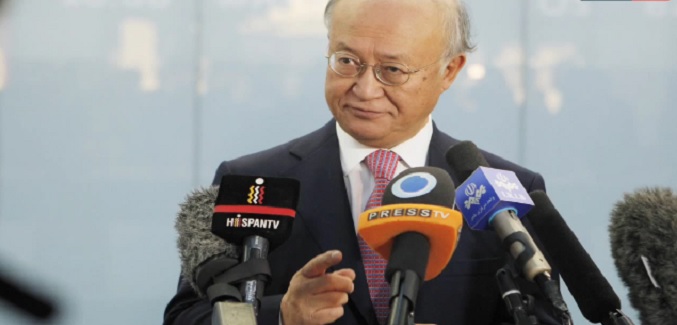Reuters reported Monday that UN nuclear watchdog International Atomic Energy Agency (IAEA) chief Yukiya Amano was increasing pressure on Iran to enhance transparency around its atomic program, after a September 7th IAEA report concluded that the Iranians were continuing to stonewall efforts to clarify the so-called “possible military dimensions” (PMDs) of their atomic program.
Iran is obligated by binding United Nations Security Council resolutions to clarify international concerns regarding PMD-related activities, which range from military involvement in acquiring nuclear material to tests related to the development of nuclear warheads.
The September 7th report noted that Iran had not only failed to enhance transparency around some of those activities, but had continued destroying relevant evidence and sites, and thereby “likely… further undermined the Agency’s ability to conduct effective verification.” Reuters assessed that Amano’s Monday comments signifying growing complications with negotiating a resolution with Iran:
In line with the findings of a confidential IAEA report earlier this month, he said Iran had not carried out two of the five transparency steps it had agreed to implement by Aug. 25.
Lack of progress in the IAEA investigation could further complicate efforts by six world powers to negotiate a resolution to the wider, decade-old dispute with Iran over its nuclear work and persuade it to curb it in exchange for a gradual ending of sanctions.
“Iran needs to be as transparent as possible to clarify these issues,” Amano told a news conference.
They came as Washington and its allies seemingly struggled to calibrate their positions toward the Islamic republic amid preparations for a Western push against ISIS. Supreme Leader Ayatollah Ali Khamenei released a statement on Monday boasting that the Obama administration had asked for help from Tehran, and had been rebuffed:
“Right from the start, the United States asked through its ambassador in Iraq whether we could cooperate against Daesh [Arabic acronym for IS],” Khamenei said in a statement on his official website.
“I said no, because they have dirty hands,” said Khamenei, who has the final say on all matters of state in Iran.
“Secretary of State [John Kerry] personally asked [Iranian counterpart] Mohammad Javad Zarif and he rejected the request,” said Khamenei, who was leaving hospital after what doctors said was successful prostate surgery.
The New York Times subsequently conveyed statements from Kerry indicating that the White House remained open to working with the Iranians despite what the outlet described as “sarcastic criticism from Iran’s supreme leader.” State Department spokesperson Marie Harf seemed to reverse that position at Monday’s afternoon press conference, stating that “we do not want to coordinate with, we are not planning to coordinate with Iran in any way on Iraq, period… we are not coordinating with them.”
[Photo: Newsloop Top News / YouTube]




